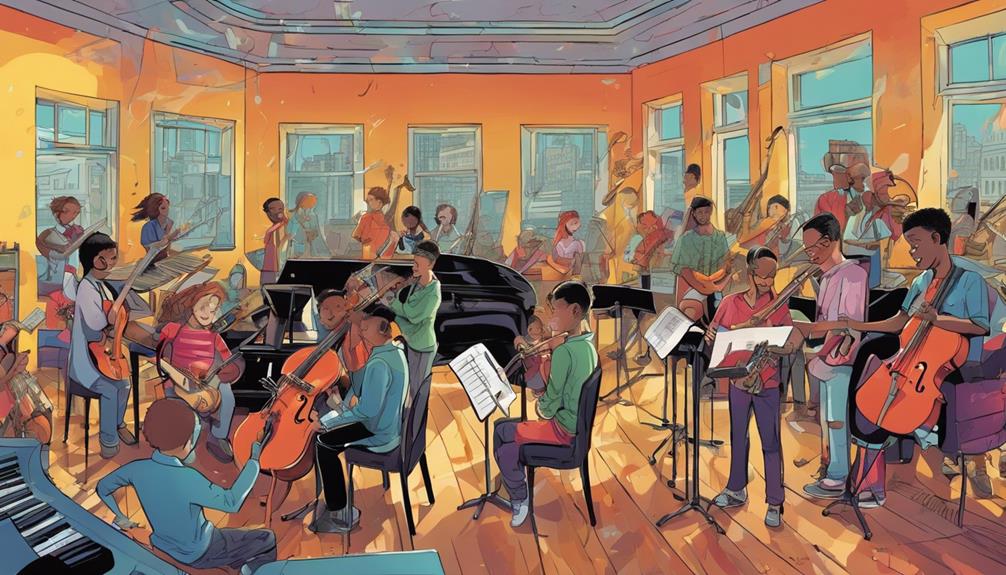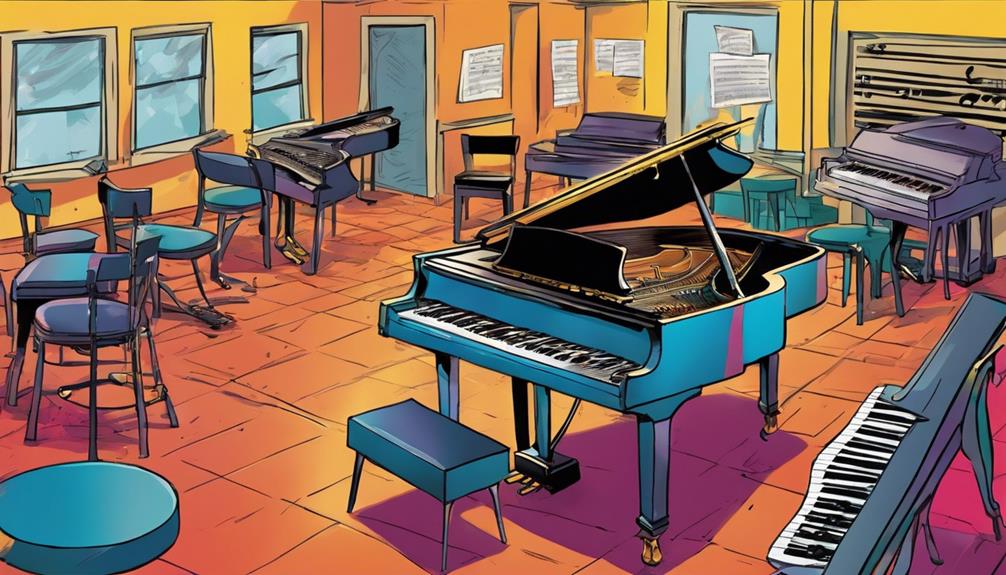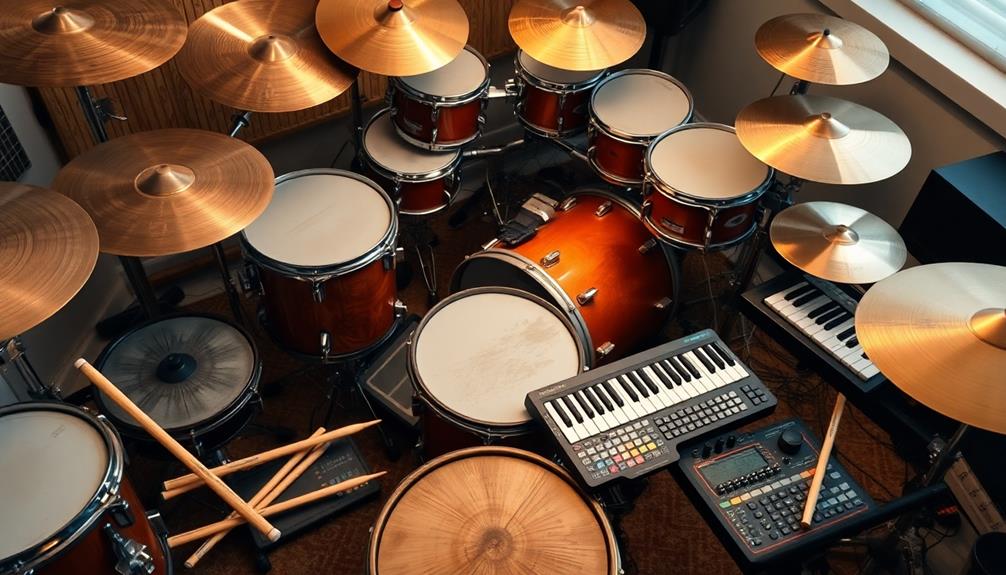To prepare for music school, you'll need to develop a strong practice routine, seeking feedback from teachers, peers, and mentors to improve your skills. Understand the specific audition requirements for each school, including repertoire, sight-reading, and theory components. Stay organized and focused by creating a practice schedule and tracking your progress. Finally, consider the logistics and costs involved, including tuition, travel, and instrument expenses. By following these steps, you'll be well on your way to success – and if you continue, you'll discover even more tips to help you stand out in a competitive field.
Key Takeaways
- Develop a consistent daily practice routine to build discipline and track progress towards music school auditions.
- Seek feedback and guidance from teachers, peers, and mentors to identify areas for improvement and refine skills.
- Research and understand specific audition requirements for each music school, including repertoire, sight-reading, and technical expectations.
- Create a detailed practice schedule and utilize tools to track assignments and rehearsals, staying organized and focused on musical goals.
- Consider the logistics and costs of attending music schools, including tuition, travel, and instrument expenses, and explore scholarship opportunities.
Develop a Strong Practice Routine
To lay the foundation for success in music school, establish a consistent daily practice routine that becomes an indispensable part of your daily life. This routine will help you build discipline, improve your skills, and track your progress.
Break down your practice sessions into focused segments to guarantee efficient learning and progress. Set specific goals for each practice session to stay motivated and directed.
A well-rounded practice routine should include warm-up exercises to loosen up your muscles, technical exercises to improve your technique, and repertoire practice to master your pieces.
Don't be afraid to experiment with different practice techniques to find what works best for your learning style. By incorporating these elements into your daily practice, you'll be well-prepared for the demands of music school.
Seek Feedback and Guidance

Seek out opportunities to perform for teachers, peers, and mentors, and be open to their feedback and guidance, as it can provide invaluable insights into your strengths and weaknesses. By doing so, you'll gain a better understanding of what you need to work on to improve your music skills. Constructive criticism from experienced musicians can help you refine your skills and prepare for auditions or performances.
| Feedback Source | Benefits |
|---|---|
| Teachers | Provide expert guidance and identify areas for improvement |
| Peers | Offer unique perspectives and suggestions from a fellow musician's point of view |
| Mentors | Share their experience and knowledge to help you navigate music school challenges |
| Self-assessment | Helps you develop a critical ear and identify areas for improvement |
| Recordings | Allows you to reflect on your performance and make adjustments |
Incorporating feedback into your practice routine can lead to significant growth and development as a musician. By seeking guidance and feedback, you'll be better equipped to tackle the challenges of music school and increase your chances of success. Remember, feedback is an essential tool for improvement, so be open to it and use it to your advantage.
Understand Audition Requirements

You'll need to thoroughly research and understand the specific audition requirements for each music school you're applying to, as these can vary greatly from one institution to another. This preparation is essential to make sure you meet the technical and stylistic expectations of each school.
Some key aspects to take into account include:
- The specific repertoire required for your instrument or voice
- Any sight-reading, theory, or aural skills components that may be part of the audition process
- The technical and stylistic expectations for your performance
- The logistics and costs of traveling to multiple schools for auditions
Understanding these requirements will help you tailor your preparation and ensure you're presenting your best work.
Don't be afraid to seek feedback from teachers, peers, or mentors on your audition pieces to guarantee you're meeting the expectations. By doing so, you'll be well-prepared for the audition process and can confidently showcase your skills.
Stay Organized and Focused

As you explore the preparation process, maintaining organization and focus becomes essential to guarantee you're using your time efficiently and making progress towards your musical goals.
To stay organized and focused, create a detailed practice schedule to allocate time for technique, repertoire, and theory. Utilize tools like calendars, planners, or apps to track assignments, rehearsals, and performances. Keep a clean and organized practice space to minimize distractions and enhance focus.
Sample Practice Schedule:
| Day | Morning | Afternoon | Evening |
|---|---|---|---|
| Mon | Technique practice (30 min) | Repertoire practice (60 min) | Theory study (30 min) |
| Tue | Rehearsal (90 min) | Performance preparation (60 min) | Review practice plan (30 min) |
| Wed | Rest day | Rest day | Rest day |
| Thu | Technique practice (30 min) | Repertoire practice (60 min) | Theory study (30 min) |
Prioritize tasks by importance and deadline to effectively manage your time and workload. Regularly review and adjust your practice plan to stay focused on your musical goals. By staying organized and focused, you'll be able to make the most of your time and achieve success in music school.
Consider Logistics and Costs

Now that you've got your practice schedule in place, it's time to crunch some numbers and take into account the logistics and costs associated with pursuing your music education. Attending a music school can be expensive, and it's crucial to have a clear understanding of the expenses involved.
Here are some key costs to take into account:
- Tuition, fees, and housing: Research the cost of attending different music schools, including tuition, fees, and housing expenses.
- Auditions and travel: Factor in the cost of auditions, travel, and accommodations for school visits.
- Instruments and lessons: Consider the cost of instruments, private lessons, and practice materials required for your program.
- Scholarships and financial aid: Explore scholarship opportunities and financial aid options to offset the costs.
Frequently Asked Questions
What to Know Before Music School?
Before music school, know the differences between BME, BM, and BA degrees, research the studio's history, prepare your theory and piano skills, and engage with current students to guarantee a smooth shift and successful music career.
How to Be Successful in Music School?
To be successful in music school, you'll need to build strong relationships with teachers and peers, stay organized, and maintain a positive attitude towards learning and growth. Additionally, it’s crucial to develop a consistent practice routine and actively seek performance opportunities to hone your skills. Understanding how to get in music school in the first place—by preparing a strong audition, securing recommendations, and showcasing your passion—lays the foundation for success once you’re there. Remember, persistence and a willingness to embrace challenges will help you thrive both academically and artistically.
How to Prepare for Music Grad School?
"Your ticket to music grad school is waiting, but first, research programs that harmonize with your goals, craft a killer audition repertoire, and gather glowing recs – then, get ready to shine!"
How to Prepare for Music in College?
To prepare for music in college, take private lessons, participate in school ensembles, and engage in community programs to build a strong musical foundation.
Conclusion
As you stand at the threshold of music school, remember that preparation is key to initiating your full potential.
By cultivating a strong practice routine, seeking feedback, understanding audition requirements, staying organized, and considering logistics, you'll set yourself up for success.
Now, take a deep breath, and unlock this melodious journey, armed with the knowledge and determination to make your musical dreams a harmonious reality.










